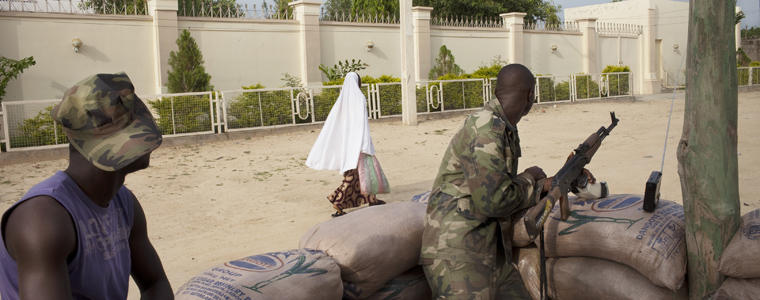How is it possible to do community policing in the absence of trust between citizens and security forces? This is just one of the questions that challenged an international group of experts as they explored the role of police and citizens, especially women, in countering violent extremism (CVE), during a workshop hosted by USIP’s Center for Gender and Peacebuilding.

The workshop grew out of the institute’s Women Preventing Extremist Violence (WPEV) Project, which aims to work with women civic activists in Kenya and Nigeria to foster relationships with police in an effort to build community resilience to violence.
The July 2014 meeting, entitled “Women Preventing Extremist Violence Expert Workshop: Examining the Parameters of Police-Community Engagement in Countering Violent Extremism,” gathered a mixed group of participants--security sector and gender experts from the United States, civic activists from Kenya and Nigeria, and police from Turkey and the United Kingdom. They defined effective community policing as a partnership between the police and the community to guarantee safety and security for both men and women.
How can communities develop mutually beneficial community policing strategies to reflect the needs of all citizens—men, women, boys and girls?
While community policing is not a new concept, the reality of providing security in transitional areas is complicated by a lack of effective and accountable institutions and basic lack of trust between civilians and the forces that are supposed to protect them. With conditions such as these, how can communities develop mutually beneficial community policing strategies to reflect the needs of all citizens—men, women, boys and girls?
The answer is that there is no one-size-fits-all approach. What emerged from the facilitated discussion, collective brainstorming activities and emblematic case studies was that good community policing is highly dependent on context, must be supported by the community, and is not always done by official police forces.
The workshop findings provided a foundation for a USIP Special Report. The publication is intended to guide practitioners on developing and designing community policing programs, the role of women in those programs and the implications for CVE strategies.
The experts honed in on the attributes that must exist in a security force for it to be capable of undertaking community policing roles. Unsurprisingly, the experts identified legitimacy, honesty, fairness, transparency, responsiveness and accountability as key characteristics for both the institution as well as the individual members of the force. The workshop participants also determined that police forces need to reflect the communities in which they work and hold shared values.
Another key outcome of the discussion was the idea that community policing is not done by the police alone, but that security is a shared responsibility for the police force and its citizens. As a result, a strong relationship based on clear communication between citizens and the police is necessary for a community policing strategy to succeed.
Experts assessed three case studies: one from northern Nigeria, another involving the Somali diaspora in London, and a third from Korogocho in Nairobi, Kenya. Participants mapped the existence of the necessary attributes for effective police-community engagement. Each case had some but not all of the attributes, and the variations among the cases reinforced the importance of context.
In some cases, racial or religious profiling undermined community policing efforts. In other situations, colonial-era policing structures impeded responsiveness to community needs. Policing structures have changed little since Nigeria’s and Kenya’s colonial eras, when the purpose of the forces was to repress citizens rather than provide them with security.
Each case, however, demonstrated a key requirement that is pivotal to effectiveness: constant and clear communication between the police force and its citizens.
Shannon Zimmerman is a senior program specialist and Megan Loney is a program assistant, both in USIP’s Center for Gender and Peacebuilding. They work on the WPEV project and helped organize and coordinate the expert workshop.



